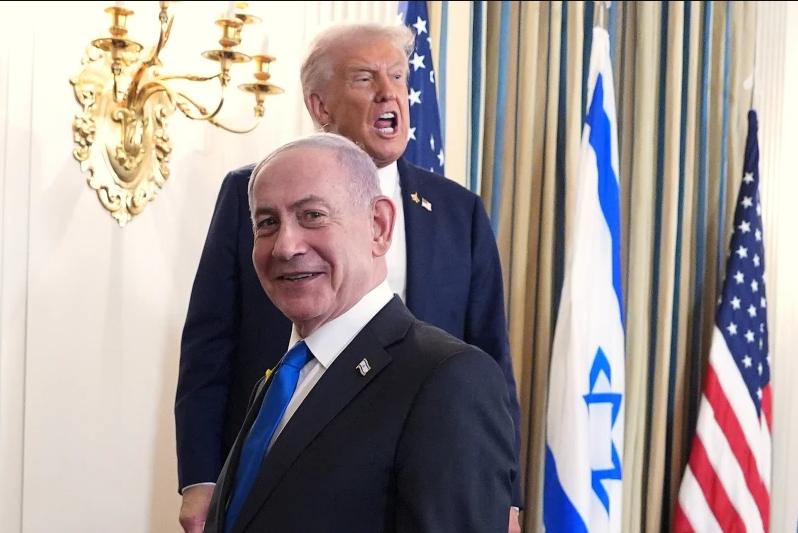Trump Secures Israel-Hamas Ceasefire and Hostage Deal in Gaza
Key Points:
- A ceasefire and hostage deal has been reached after intense diplomacy led by the Trump administration.
- The agreement required significant help from Arab and Muslim allies.
- A key turning point was an apology from Israeli Prime Minister Netanyahu to Qatar.
After months of deadlock, President Donald Trump has secured a major ceasefire and hostage deal between Israel and Hamas in Gaza. The agreement was reached following weeks of intense diplomatic efforts involving key Arab and Muslim allies.
The deal will pause the fighting that began with the Hamas attack on October 7, 2023. As part of the agreement, Hamas is set to release 48 hostages in the coming days, with about 20 believed to be alive.
According to senior U.S. officials, the turning point came when a weakened Hamas realized the hostages were more of a liability than an asset. They said negotiators, led by special envoy Steve Witkoff and Trump’s son-in-law Jared Kushner, sensed an opening when they felt that “Hamas had enough.”
However, reaching an agreement was complicated by deep distrust between Israel and its neighbors. Major questions also remain about the future governance and reconstruction of Gaza, as well as whether Hamas will disarm—a key Israeli demand the group has not yet accepted.
For now, the deal marks a delicate truce and a step toward fulfilling Trump’s campaign promise to bring all remaining hostages home.
An Airstrike That Nearly Derailed Talks
In early September, ceasefire talks mediated by the U.S., Egypt, and Qatar had stalled. Hamas insisted on the release of hundreds of Palestinian prisoners and a full Israeli withdrawal from Gaza in exchange for the hostages. Israeli Prime Minister Benjamin Netanyahu rejected these terms, demanding Hamas’s surrender.
On September 9, the situation escalated when an Israeli airstrike hit Doha, Qatar, targeting Hamas leaders who were discussing the ceasefire proposal. The strike killed five Hamas members and a Qatari security officer.
The attack infuriated Gulf Arab leaders and the White House, forcing Trump into immediate damage control to reassure Qatar, a close U.S. ally. The war threatened to spiral out of control across the Middle East.
Despite the strike, Qatari officials continued working with Witkoff and Kushner to shape what would become Trump’s 20-point peace plan. Two weeks later, Trump met with leaders from eight Arab and Muslim nations at the United Nations to build support for the plan, highlighting Israel’s growing isolation.
A Crucial Apology and a Breakthrough
With a finalized plan, Witkoff and Kushner arranged a critical meeting between Trump and Netanyahu at the White House. They devised a crucial step: they convinced Trump to have Netanyahu make a direct apology to Qatar for the strike.
During the meeting, Trump called Qatar’s Prime Minister Mohammed bin Abdulrahman Al Thani and handed the phone to Netanyahu, who read from a written apology, expressing regret for violating Qatari sovereignty.
Following this, Netanyahu publicly announced he had accepted Trump’s plan. U.S. negotiators then worked through intermediaries in Egypt and Qatar to get Hamas on board.
The U.S. plan requires Hamas to release all hostages within 72 hours, give up power in Gaza, and disarm, in exchange for hundreds of Palestinian prisoners.
Trump’s Decisive Move
Hamas’s response was a qualified “yes.” While they agreed to release hostages and yield power, they wanted more negotiation on other points, especially their disarmament.
The U.S. and Israel could have rejected this as a “no.” However, in a pivotal move, Trump was the first to react, publicly framing the response as a positive step and a sign that Hamas was ready for peace. This created momentum that was hard to reverse.
Following Trump’s lead, Netanyahu announced that Israel was preparing for the “first stage” of the plan—the hostage release—while remaining committed to its long-term war goals.
Israeli Foreign Minister Gideon Saar later admitted that while many Israeli officials were skeptical of Hamas’s acceptance, Trump’s decision to portray it as a positive sign created a real opportunity.
In an interview, Trump said he hoped the deal would help repair Israel’s international standing. “I spoke to Bibi Netanyahu,” Trump said, using the Prime Minister’s nickname. “I said, ‘Israel cannot fight the world, Bibi.’ And he understands that very well.”
